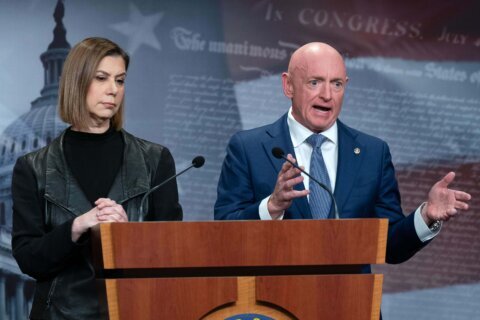Hundreds of millions of documents that shed light on everything from the hardships of Civil War widows to the mysteries of UFOs are waiting to be transcribed at the National Archives.
Recently, the call went out for more “citizen archivists,” volunteers who sift through everything from insurance claims, draft notices and personal letters to shed light on famous names in history and the lives of everyday Americans.
Suzanne Isaacs, community manager with the National Archives, said volunteers can sign up to work on documents wherever they are.
They can work on just one or two documents, or follow the example of Alex Smith, a 9-year volunteer who is a bit of a rock star as far as National Archives staff are concerned.
Smith, who’s a retired university registrar from Pennsylvania gave a ballpark figure of the number of documents he’s transcribed.
“I hit 100,000 last spring,” he told WTOP.
Smith, who said it’s fair to describe him as detail-oriented, explained what attracted him to the task.
“I was looking for something to give purpose, and could give some structure to my retired life,” he said. “It was just perfect.”
Having the ability to read cursive is not a requirement, Isaacs said. Lots of typed documents are part of the collection.
“We have pages that are odd sizes, they’re folded or torn, ink bleeds through, there’s all sorts of things that make it not as easy for a computer to read,” Isaacs said.
And that’s where putting the eyes of volunteers on the documents is helpful.
Smith said he found that many younger people are “bewildered” by cursive, and that since volunteering, he’s found, “You learn to have new heroes,” meaning, “people who have beautiful penmanship.”
Among those historical figures who have made Smith’s task easier, “Martin Van Buren, who I knew nothing about, really, as a president, has marvelous penmanship. And you think, ‘Yes! I can read what you’re writing.'”
There are times when either handwritten or typed documents may have portions that appear indecipherable.
“Every word that you are able to figure out will help us and if it’s not perfect, it’s still OK,” Isaacs said.
The model is similar to that of Wikipedia, where volunteers may take up already transcribed documents and update them.
Smith has had some fascinating finds, from a letter from the Green Bay Packers offering a young, pre-Presidential Gerald Ford a position on the team to insurance claims from those aboard the Titanic.
Among the most moving documents, said Smith, are the letters from Civil War widows trying to secure pension benefits.
“You’re seeing people in desperate straits,” he said. “They’re trying desperately to get some reasonable pension paid to them, and you think, ‘these are individual tragedies,'”
The National Archives works with the National Park Service, and in some cases, the documents transcribed by National Archives volunteers will become part of park ranger presentations, Isaacs said.
“I just think it’s just so neat, that loop there,” she said.
More information on how to apply to volunteer is available online.
As the nation prepares to celebrate the 250th anniversary of American independence, there’s a current “mission” to transcribe Revolutionary War pension files.
Get breaking news and daily headlines delivered to your email inbox by signing up here.
© 2024 WTOP. All Rights Reserved. This website is not intended for users located within the European Economic Area.








